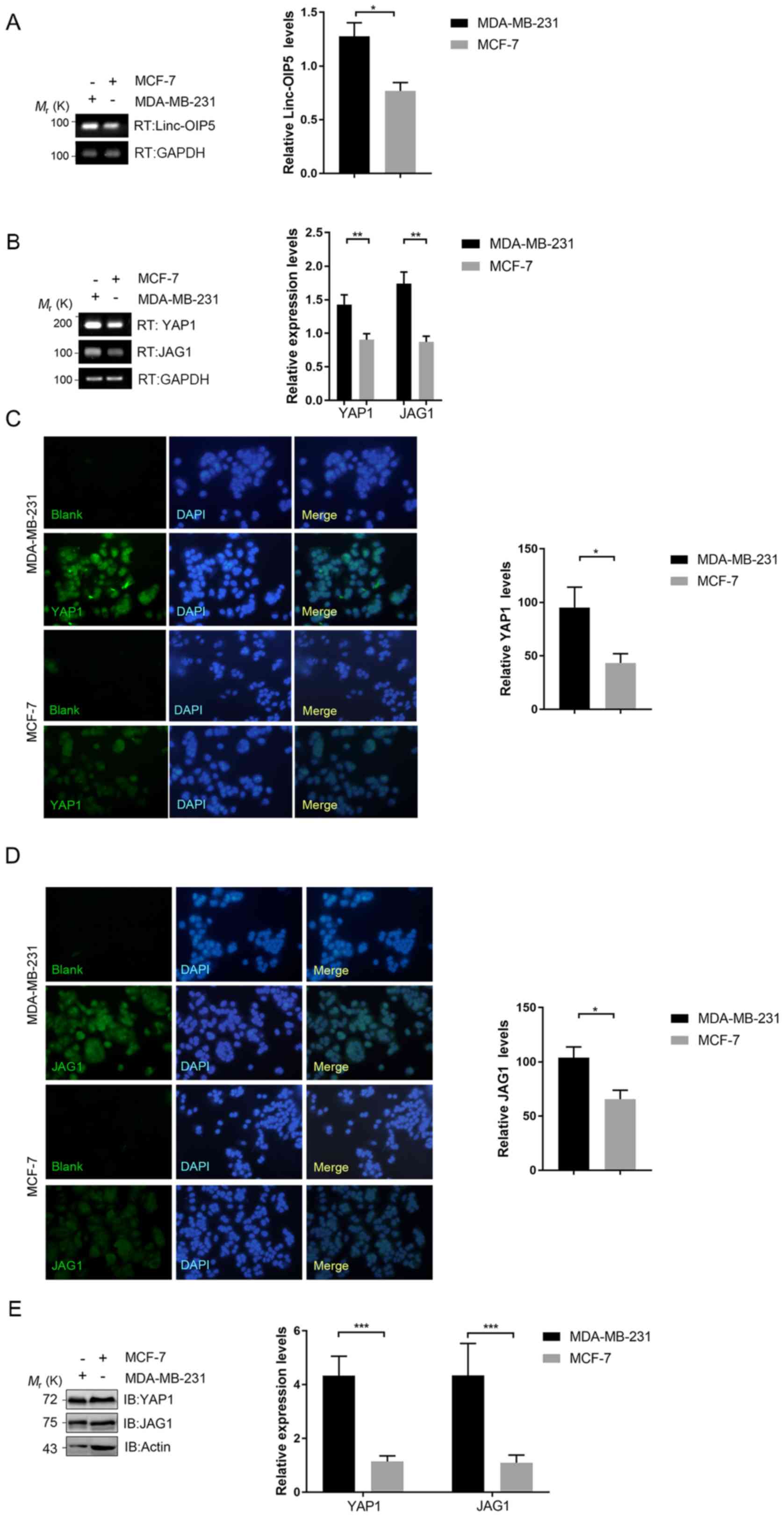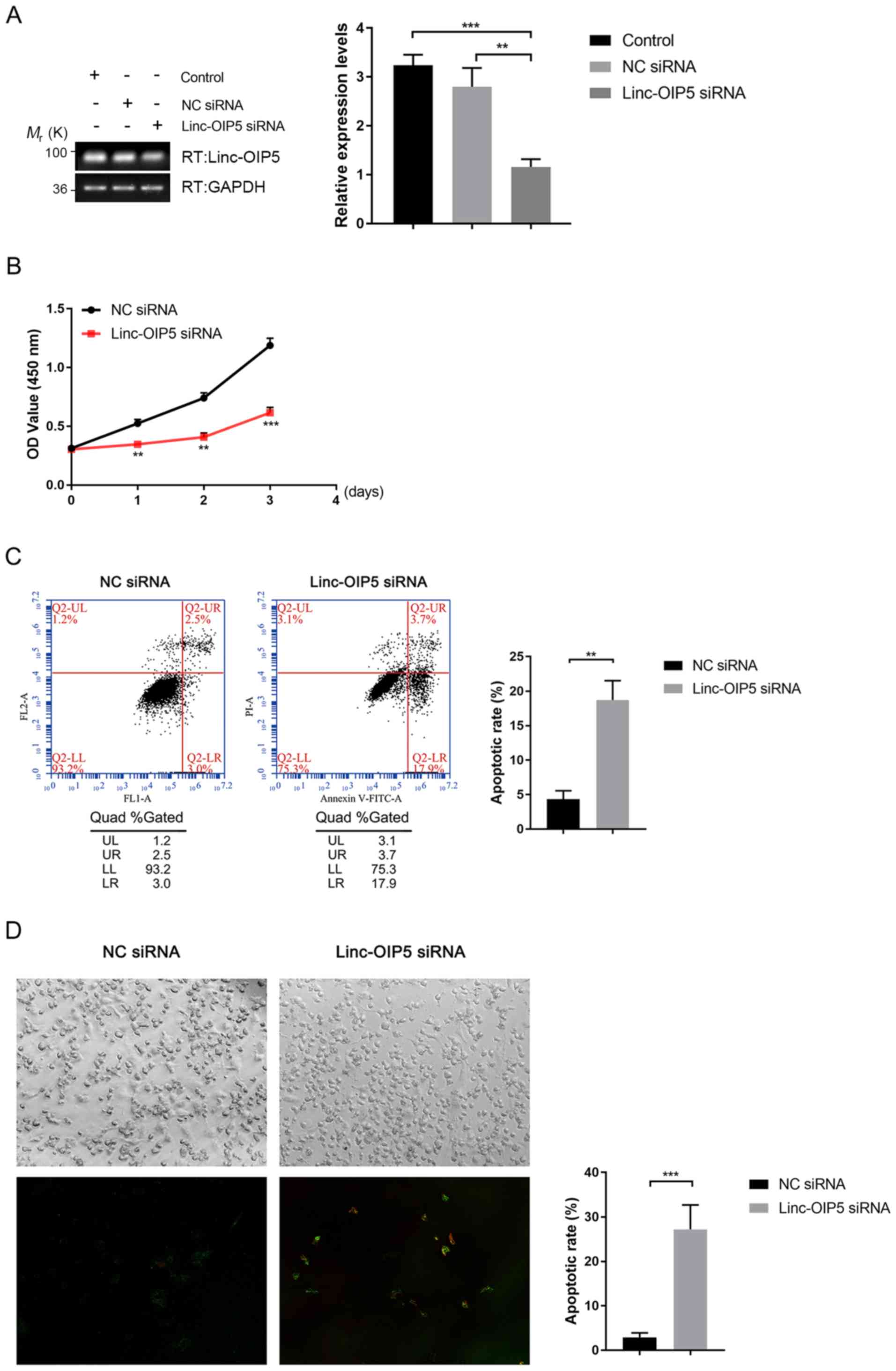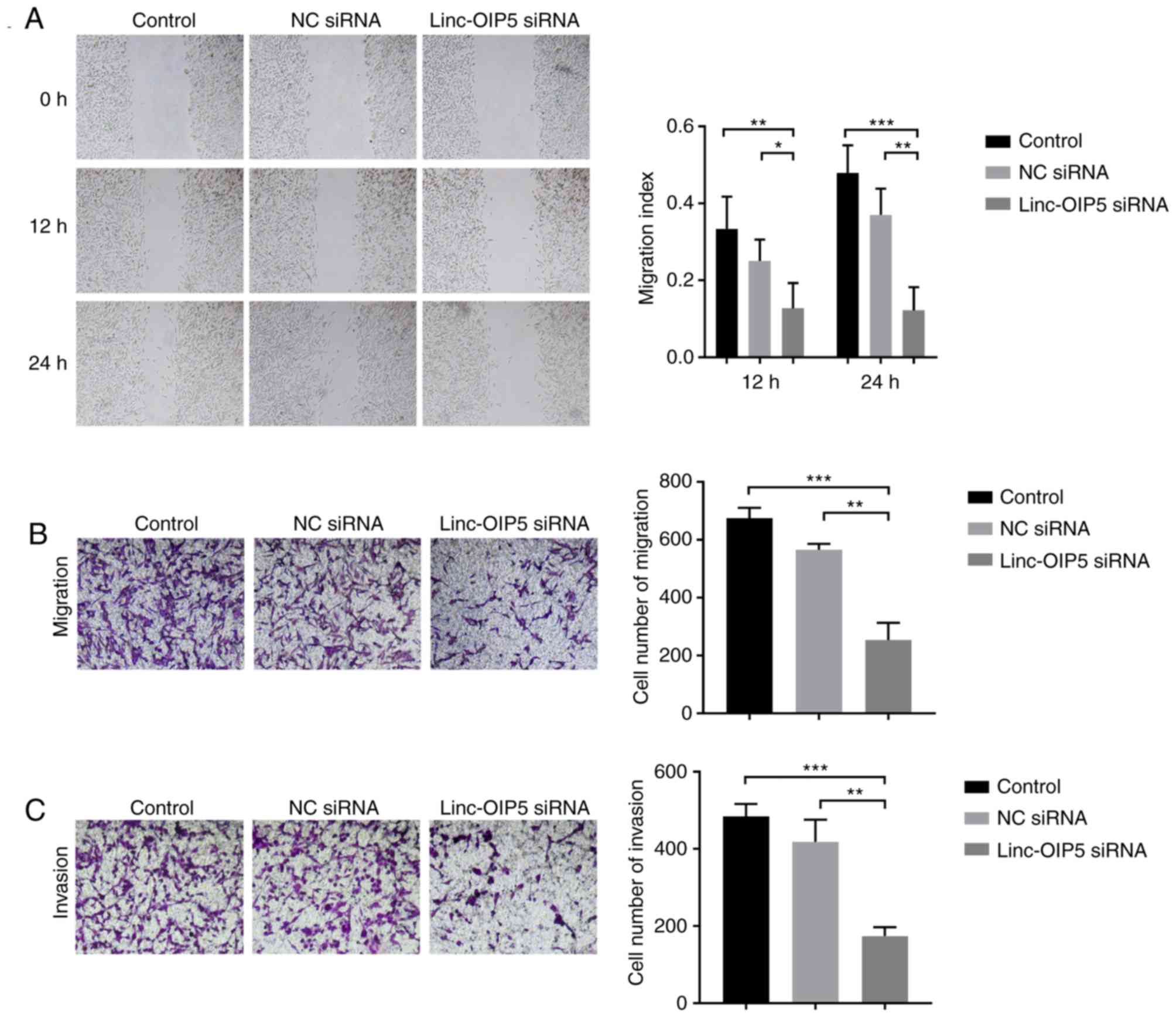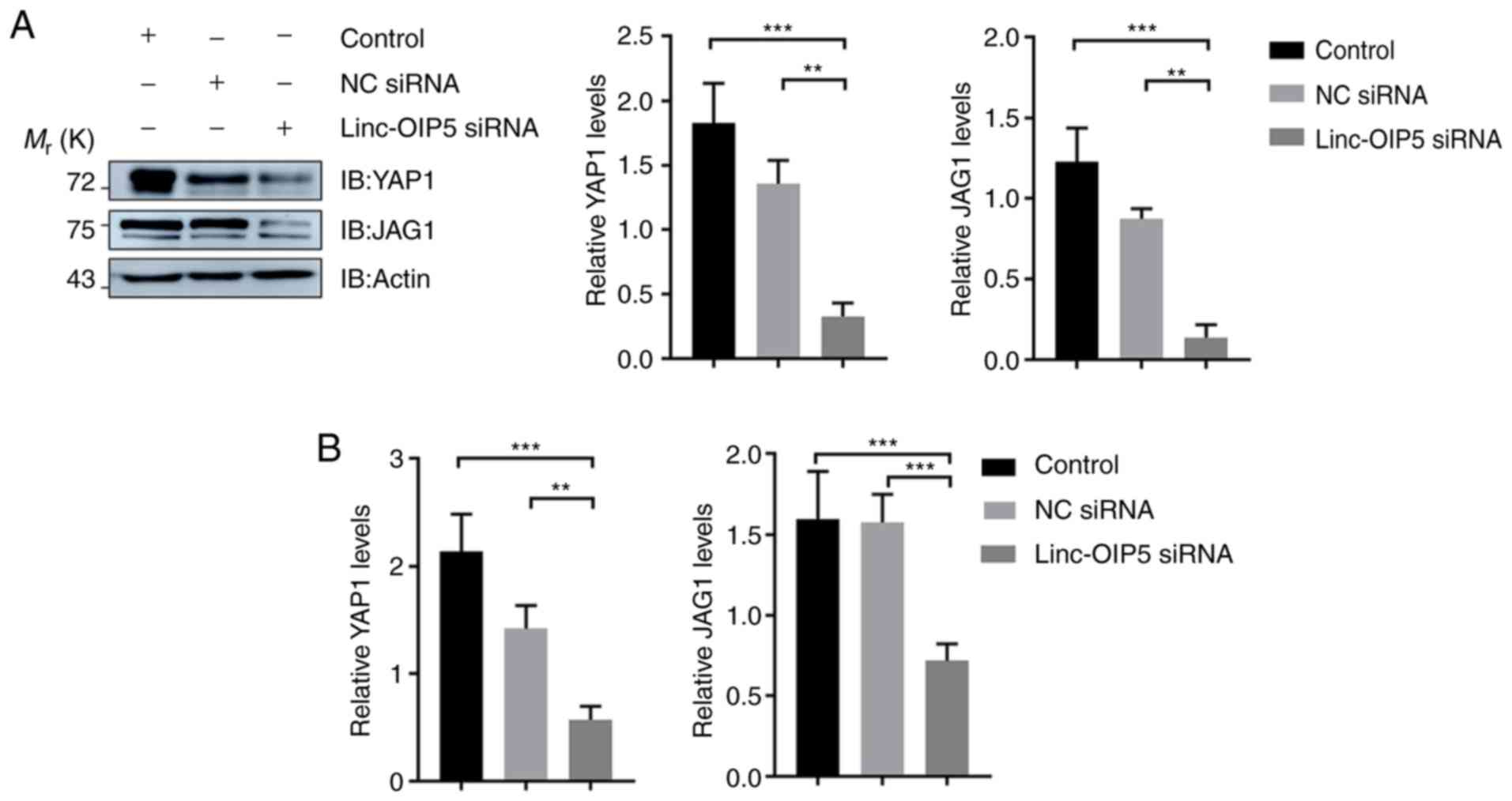|
1
|
Lobba ARM, Carreira ACO, Cerqueira OLD,
Fujita A, DeOcesano-Pereira C, Osorio CAB, Soares FA, Rameshwar P
and Sogayar MC: High CD90 (THY-1) expression positively correlates
with cell transformation and worse prognosis in basal-like breast
cancer tumors. PLoS One. 13:e01992542018. View Article : Google Scholar : PubMed/NCBI
|
|
2
|
Fan S, Fan C, Liu N, Huang K, Fang X and
Wang K: Downregulation of the long non-coding RNA ZFAS1 is
associated with cell proliferation, migration and invasion in
breast cancer. Mol Med Rep. 17:6405–6412. 2018.PubMed/NCBI
|
|
3
|
Zhao W, Geng D, Li S, Chen Z and Sun M:
LncRNA HOTAIR influences cell growth, migration, invasion, and
apoptosis via the miR-20a-5p/HMGA2 axis in breast cancer. Cancer
Med. 7:842–855. 2018. View Article : Google Scholar : PubMed/NCBI
|
|
4
|
Wang P, Wang F, Wang L and Pan JH:
Proprotein convertase subtilisin/kexin type 6 activates the
extracellular signal-regulated kinase 1/2 and Wnt family member 3A
pathways and promotes in vitro proliferation, migration and
invasion of breast cancer MDA-MB-231 cells. Oncol Lett. 16:145–150.
2018.PubMed/NCBI
|
|
5
|
Liang Y, Chen H, Ji L, Du J, Xie X, Li X
and Lou Y: Talin2 regulates breast cancer cell migration and
invasion by apoptosis. Oncol Lett. 16:285–293. 2018.PubMed/NCBI
|
|
6
|
Wen Y, Ji Y, Zhang Y, Jiang B, Tang C,
Wang Q, Chen X, Jia L, Gu W and Xu X: Knockdown of Yes-associated
protein induces the apoptosis while inhibits the proliferation of
human periodontal ligament stem cells through crosstalk between Erk
and Bcl-2 signaling pathways. Int J Med Sci. 14:1231–1240. 2017.
View Article : Google Scholar : PubMed/NCBI
|
|
7
|
Jiang N, Ke B, Hjortjensen K, Iglesiasgato
D, Wang Z, Chang PC, Zhao Y, Niu XD, Wu T, Peng B, et al: YAP1
regulates prostate cancer stem cell-like characteristics to promote
castration resistant growth. Oncotarget. 8:115054–115067. 2017.
View Article : Google Scholar : PubMed/NCBI
|
|
8
|
Xu Y, Lin X, Xu J, Jing H, Qin Y and Li Y:
SULT1E1 inhibits cell proliferation and invasion by activating
PPARγ in breast cancer. J Cancer. 9:1078–1087. 2018. View Article : Google Scholar : PubMed/NCBI
|
|
9
|
Jemal A, Bray F, Center MM, Ferlay J, Ward
E and Forman D: Global cancer statistics. CA Cancer J Clin.
61:69–90. 2011. View Article : Google Scholar : PubMed/NCBI
|
|
10
|
Torre LA, Bray F, Siegel RL, Ferlay J,
Lortet-Tieulent J and Jemal A: Global cancer statistics, 2012. CA
Cancer J Clin. 65:87–108. 2015. View Article : Google Scholar : PubMed/NCBI
|
|
11
|
Ferlay J, Soerjomataram I, Dikshit R, Eser
S, Mathers C, Rebelo M, Parkin DM, Forman D and Bray F: Cancer
incidence and mortality worldwide: Sources, methods and major
patterns in GLOBOCAN 2012. Int J Cancer. 136:e359–e386. 2015.
View Article : Google Scholar : PubMed/NCBI
|
|
12
|
Deng J, Deng H, Liu C, Liang Y and Wang S:
Long non-coding RNA OIP5-AS1 functions as an oncogene in lung
adenocarcinoma through targeting miR-448/Bcl-2. Biomed
Pharmacother. 98:102–110. 2018. View Article : Google Scholar : PubMed/NCBI
|
|
13
|
Mendell JT: Targeting a long noncoding RNA
in breast cancer. N Engl J Med. 374:2287–2289. 2016. View Article : Google Scholar : PubMed/NCBI
|
|
14
|
Arun G, Diermeier S, Akerman M, Chang KC,
Wilkinson JE, Hearn S, Kim Y, MacLeod AR, Krainer AR, Norton L, et
al: Differentiation of mammary tumors and reduction in metastasis
upon Malat1 lncRNA loss. Genes Dev. 30:34–51. 2016. View Article : Google Scholar : PubMed/NCBI
|
|
15
|
Bergmann JH and Spector DL: Long
non-coding RNAs: Modulators of nuclear structure and function. Curr
Opin Cell Biol. 26:10–18. 2014. View Article : Google Scholar : PubMed/NCBI
|
|
16
|
Rinn JL and Chang HY: Genome regulation by
long noncoding RNAs. Ann Rev Biochem. 81:145–166. 2012. View Article : Google Scholar : PubMed/NCBI
|
|
17
|
Meseure D, Drak Alsibai K, Nicolas A,
Bieche I and Morillon A: Long noncoding RNAs as new architects in
cancer epigenetics, prognostic biomarkers, and potential
therapeutic targets. Biomed Res Int. 2015:3202142015. View Article : Google Scholar : PubMed/NCBI
|
|
18
|
Pandey GK and Kanduri C: Long noncoding
RNAs and neuroblastoma. Oncotarget. 6:18265–18275. 2015. View Article : Google Scholar : PubMed/NCBI
|
|
19
|
Yang N, Chen J, Zhang H, Wang X, Yao H,
Peng Y and Zhang WG: LncRNA OIP5-AS1 loss-induced microRNA-410
accumulation regulates cell proliferation and apoptosis by
targeting KLF10 via activating PTEN/PI3K/AKT pathway in multiple
myeloma. Cell Death Dis. 8:e29752017. View Article : Google Scholar : PubMed/NCBI
|
|
20
|
Wu N, Nguyen Q, Wan Y, Zhou T, Venter J,
Frampton GA, DeMorrow S, Pan D, Meng F, Glaser S, et al: The Hippo
signaling functions through the Notch signaling to regulate
intrahepatic bile duct development in mammals. Lab Invest.
97:843–853. 2017. View Article : Google Scholar : PubMed/NCBI
|
|
21
|
Gonzalez-King H, García NA, Ontoria-Oviedo
I, Ciria M, Montero JA and Sepúlveda P: Hypoxia Inducible Factor-1α
potentiates Jagged1-mediated angiogenesis by mesenchymal stem
cell-derived exosomes. Stem Cells. 35:1747–1759. 2017. View Article : Google Scholar : PubMed/NCBI
|
|
22
|
Sheldon H, Heikamp E, Turley H, Dragovic
R, Thomas P, Oon CE, Leek R, Edelmann M, Kessler B, Sainson RC, et
al: New mechanism for Notch signaling to endothelium at a distance
by Delta-like 4 incorporation into exosomes. Blood. 116:2385–2394.
2010. View Article : Google Scholar : PubMed/NCBI
|
|
23
|
Pan D: Hippo signaling in organ size
control. Genes Dev. 21:886–897. 2007. View Article : Google Scholar : PubMed/NCBI
|
|
24
|
Pan D: The hippo signaling pathway in
development and cancer. Dev Cell. 19:491–505. 2010. View Article : Google Scholar : PubMed/NCBI
|
|
25
|
Yimlamai D, Christodoulou C, Galli GG,
Yanger K, Pepe-Mooney B, Gurung B, Shrestha K, Cahan P, Stanger BZ
and Camargo FD: Hippo pathway activity influences liver cell fate.
Cell. 157:1324–1338. 2014. View Article : Google Scholar : PubMed/NCBI
|
|
26
|
Ramos A and Camargo FD: The Hippo
signaling pathway and stem cell biology. Trends Cell Biol.
22:339–346. 2012. View Article : Google Scholar : PubMed/NCBI
|
|
27
|
Mammoto A, Muyleart M, Kadlec A, Gutterman
D and Mammoto T: YAP1-TEAD1 signaling controls angiogenesis and
mitochondrial biogenesis through PGC1α. Microvas Res. 119:73–83.
2018. View Article : Google Scholar
|
|
28
|
Oon CE, Bridges E, Sheldon H, Sainson RCA,
Jubb A, Turley H, Leek R, Buffa F, Harris AL and Li JL: Role of
Delta-like 4 in Jagged1-induced tumour angiogenesis and tumour
growth. Oncotarget. 8:40115–40131. 2017. View Article : Google Scholar : PubMed/NCBI
|
|
29
|
Benedito R, Roca C, Sörensen I, Adams S,
Gossler A, Fruttiger M and Adams RH: The notch ligands Dll4 and
Jagged1 have opposing effects on angiogenesis. Cell. 137:1124–1135.
2009. View Article : Google Scholar : PubMed/NCBI
|
|
30
|
Aspalter IM, Gordon E, Dubrac A, Ragab A,
Narloch J, Vizán P, Geudens I, Collins RT, Franco CA, Abrahams CL,
et al: Alk1 and Alk5 inhibition by Nrp1 controls vascular sprouting
downstream of Notch. Nat Comm. 17:72642015. View Article : Google Scholar
|
|
31
|
Lin C and Xu X: YAP1-TEAD1-Glut1 axis
dictates the oncogenic phenotypes of breast cancer cells by
modulating glycolysis. Biomed Pharmacother. 95:789–794. 2017.
View Article : Google Scholar : PubMed/NCBI
|
|
32
|
Wang T, Mao B, Cheng C, Zou Z, Gao J, Yang
Y, Lei T, Qi X, Yuan Z, Xu W and Lu Z: YAP promotes breast cancer
metastasis by repressing growth differentiation factor-15. Biochim
Biophys Acta Mol Basis Dis. 1864:1744–1753. 2018. View Article : Google Scholar : PubMed/NCBI
|
|
33
|
Wu Q, Li J and Sun S, Chen X, Zhang H, Li
B and Sun S: YAP/TAZ-mediated activation of serine metabolism and
methylation regulation is critical for LKB1-deficient breast cancer
progression. Biosci Rep. 37(pii): BSR201710722017. View Article : Google Scholar : PubMed/NCBI
|
|
34
|
Hou L, Chen L and Fang L: Scutellarin
inhibits proliferation, invasion, and tumorigenicity in human
breast cancer cells by regulating HIPPO-YAP signaling pathway. Med
Sci Monit. 23:5130–5138. 2017. View Article : Google Scholar : PubMed/NCBI
|
|
35
|
Selcuklu SD, Donoghue MT, Kerin MJ and
Spillane C: Regulatory interplay between miR-21, JAG1 and
17beta-estradiol (E2) in breast cancer cells. Biochem Biophys Res
Commun. 423:234–239. 2012. View Article : Google Scholar : PubMed/NCBI
|
|
36
|
Dickson BC, Mulligan AM, Zhang H, Lockwood
G, O'Malley FP, Egan SE and Reedijk M: High-level JAG1 mRNA and
protein predict poor outcome in breast cancer. Mod Pathol.
20:685–693. 2007. View Article : Google Scholar : PubMed/NCBI
|
|
37
|
Reedijk M, Pinnaduwage D, Dickson BC,
Mulligan AM, Zhang H, Bull SB, O'Malley FP, Egan SE and Andrulis
IL: JAG1 expression is associated with a basal phenotype and
recurrence in lymph node-negative breast cancer. Breast Cancer Res
Treat. 111:439–448. 2008. View Article : Google Scholar : PubMed/NCBI
|
|
38
|
Slemmons KK, Crose LES, Riedel S,
Sushnitha M, Belyea B and Linardic CM: A novel Notch-YAP circuit
drives stemness and tumorigenesis in embryonal rhabdomyosarcoma.
Mol Cancer Res. 15:1777–1791. 2017. View Article : Google Scholar : PubMed/NCBI
|
|
39
|
Livak KJ and Schmittgen TD: Analysis of
relative gene expression data using real-time quantitative PCR and
the 2(-Delta Delta C(T)) method. Methods. 25:402–408. 2001.
View Article : Google Scholar : PubMed/NCBI
|
|
40
|
Zeng H, Wang J, Chen T, Zhang K, Chen J,
Wang L, Li H, Tuluhong D, Li J and Wang S: Downregulation of long
non-coding RNA Opa interacting protein 5-antisense RNA 1 inhibits
breast cancer progression by targeting sex-determining region Y-box
2 by microRNA-129-5p upregulation. Cancer Sci. 110:289–302.
2019.PubMed/NCBI
|
|
41
|
Yilmaz M and Christofori G: EMT, the
cytoskeleton, and cancer cell invasion. Cancer Metastasis Rev.
28:15–33. 2009. View Article : Google Scholar : PubMed/NCBI
|
|
42
|
Klymkowsky MW and Savagner P:
Epithelial-mesenchymal transition: A cancer researcher's conceptual
friend and foe. Am J Pathol. 174:1588–1593. 2009. View Article : Google Scholar : PubMed/NCBI
|
|
43
|
Ansieau S, Courtois-Cox S, Morel AP and
Puisieux A: Failsafe program escape and EMT: A deleterious
partnership. Semin Cancer Biol. 21:392–396. 2011.PubMed/NCBI
|


















